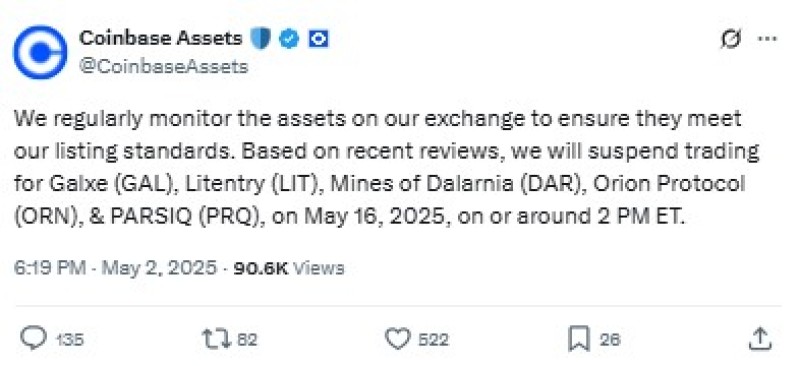The leading US crypto exchange announced plans to remove Galxe (GAL), Litentry (LIT), Mines of Dalarnia (DAR), Orion Protocol (ORN), and PARSIQ (PRQ) tokens due to new versions being released.
Coinbase, one of the largest cryptocurrency exchanges in the United States, has revealed plans to delist five digital assets from its trading platform next week. The announcement came on Friday, May 2, when Coinbase Assets, the exchange's official X (formerly Twitter) account dedicated to listing updates, informed followers about the impending removal of several tokens that no longer meet the platform's listing criteria.
Which Tokens Are Affected by Coinbase's GAL, LIT, DAR, ORN & PRQ Delisting?
According to the announcement, Coinbase will suspend trading for five cryptocurrency tokens: Galxe (GAL), Litentry (LIT), Mines of Dalarnia (DAR), Orion Protocol (ORN), and PARSIQ (PRQ). The delisting is scheduled to take effect on May 16, 2025, at approximately 2:00 p.m. Eastern Time.

The exchange cited specific reasons for removing these assets from its platform. According to Coinbase, these tokens are being delisted because their developers have released new versions, rendering the original tokens non-compliant with Coinbase's listing standards. This move is part of Coinbase's regular review process to ensure all listed assets maintain compliance with their quality and security requirements.
How Will the GAL, LIT, DAR, ORN & PRQ Delisting Affect Coinbase Users?
Following the delisting announcement, Coinbase has already implemented changes to prepare users for the transition. The order books for Galxe (GAL), Litentry (LIT), Mines of Dalarnia (DAR), Orion Protocol (ORN), and PARSIQ (PRQ) have been switched to limit-only mode. This means that while users can still place and cancel limit orders for these tokens, and matching trades may still occur, the trading functionality is already being restricted ahead of the complete suspension.
The delisting will impact all of Coinbase's trading platforms, including Coinbase Simple Trade, Coinbase Advanced Trade, Coinbase Exchange, and Coinbase Prime. This comprehensive approach ensures uniform treatment across all of the company's trading services, providing clarity to users across different segments of the Coinbase ecosystem.
What Should GAL, LIT, DAR, ORN & PRQ Holders Do Before the Delisting?
With just two weeks until the official delisting date, holders of the affected tokens have limited time to make informed decisions about their assets. Although Coinbase hasn't explicitly issued guidelines for token holders, the standard procedure in such cases suggests users have several options to consider.
Users holding Galxe (GAL), Litentry (LIT), Mines of Dalarnia (DAR), Orion Protocol (ORN), or PARSIQ (PRQ) on Coinbase may want to either sell their holdings before the delisting date or withdraw them to external wallets where they retain control of their assets. For those looking to migrate to the new token versions mentioned by Coinbase, they will need to follow the specific migration instructions provided by each project's development team, as Coinbase has not indicated plans to support automatic token swaps or migrations.
Why Coinbase's Decision to Delist GAL, LIT, DAR, ORN & PRQ Matters to the Market
Coinbase's delisting decisions often carry significant weight in the cryptocurrency market due to the exchange's prominence and regulatory compliance in the United States. As one of the few publicly traded crypto companies, Coinbase's asset listing and delisting actions are closely monitored by investors, regulators, and market participants alike.
The specific reason cited for this delisting round—the release of new token versions—highlights the evolving nature of blockchain projects. Many cryptocurrency projects undergo upgrades, forks, or token swaps as part of their development roadmap, requiring exchanges to regularly reassess their listings to ensure they're offering the most current and compliant versions of each asset.
For the projects themselves, being delisted from a major exchange like Coinbase can potentially impact liquidity and accessibility for their tokens. However, since the delisting is related to technical upgrades rather than fundamental concerns about the projects, the affected teams likely have migration paths in place for token holders.
The crypto community should keep an eye on official communications from both Coinbase and the respective project teams for more details about the token migrations and any additional exchanges that might list the new versions of these tokens. This transition period represents both a challenge and an opportunity for the affected projects to communicate effectively with their communities and ensure smooth migration processes.
As the May 16 deadline approaches, traders and investors holding these assets on Coinbase should make timely decisions about their holdings to avoid potential complications once trading is suspended across all Coinbase platforms.
 Peter Smith
Peter Smith

 Peter Smith
Peter Smith


